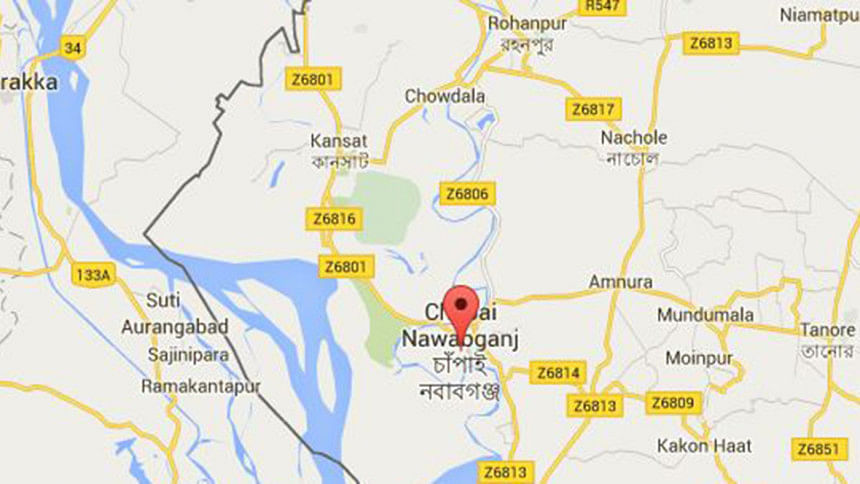‘Commission business’ of another kind

To have firsthand knowledge about Phensedyl smuggling in the wake of an apparent rise in the flow of this contraband, our staff correspondent Mohammad Jamil Khan went to two villages in Chapainawabganj, a northwestern district bordering India. The villages are among those border pockets through which the drug is trafficked into the country. Here is what he found and what he learnt:
It requires a series of planning and a good amount of cash to start a new business. But for the residents of Azmatpur village, only Tk 1 lakh is quite enough to start what is locally known as “commission business”.
This is actually the trade of Phensedyl, a codeine-based Indian cough syrup banned in 2016, which was a top choice among drug addicts in Bangladesh before yaba gained its foothold.
“You can buy 12 cases of Phensedyl at Tk 84,000, each containing 25 bottles. A single case would cost Tk 7,000,” said a 30-year-old man, who has been a smuggler for the last one decade.
“But a commission of Tk 3,000 has to be paid to the carriers for bringing every hundred bottles from the border to the village. A carrier will get Tk 9,000 if he brings in a consignment of 12 cases, which means 300 bottles of Phensedyl.”
That’s why locals call it “commission business”, he said. The Daily Star managed to reach him with the help of two villagers.
These shipments mostly come from the villages of Shoshani, Mohotpur and Goshtola in the Indian state of West Bengal.
Usually farmers, day labourers and cowboys act as the carriers. A group of three go to the border points at a time to collect a consignment, which is not less than 300 bottles.
Several dozen inhabitants in Azmatpur and neighbouring Telkupi village are involved with the nexus.
HOW CARRIERS OPERATE
In Azmatpur, which is close to the Bangladesh-India border, people don’t accept unknown faces easily. They take strangers as police informants, said a number of locals.
“If you are not a known face, villagers may surround you and start asking questions,” said one of them.
This correspondent got acquainted with two villagers with the help of a local newspaper reporter and travelled with them on a microbus from Chapainawabganj town to Azmatpur.
After a two-hour journey on the 38km road, starting around 9:30am on November 18, they reached a small local bazaar on the bank of a narrow river locally called the Pagla. The other side is Indian territory.
A group of villagers started following them but went away after the two travelling with the correspondent gestured assuring them that it’s alright.
The two convinced a farmer, who also works as Phensedyl carrier, to talk to the correspondent.
Over a cup of tea at a tea stall on the river bank, he said they bring in Phensedyl round the year.
“The smugglers give the details about a scheduled delivery of the bottles by Indian counterparts. The Indian smugglers throw the cases of plastic bottles across the border fence.
“We do not bring any consignment below 300 bottles. Usually it’s a group of three who collect a consignment.”
If the consignments are big, like 3,000 or 5,000 bottles, then dozens of people are assigned.
About the payments, he said they take a commission of Tk 3,000 for 100 bottles. “The team leader will get Tk 1,400 and the two other associates will get Tk 800 each.”
Talking about the sale, he said, “You will get Tk 1,000 extra, every time you cross one kilometre road from the border. For example, the price of 100 bottles of Phensedyl is Tk 28,000 in Azmatpur but in Shibganj, which is around 11 kilometres away from the village, it is Tk 38,000.
“Similarly, the price of 100 bottles is Tk 48,000 in Chapainawabganj.”
According to sources, a consignment of the same size costs almost double after it reaches Dhaka. A package of 100 bottles of Phensedyl is priced at Tk 70,000 to Tk 80,000 in the capital.
POLICE KNOW EVERYTHING
The Daily Star managed to collect a list of Phensedyl smugglers of the villages. Prepared by Shibganj Police Station, the list mentions around 27 people.
There are another 27 people in the list but they are mentioned as “collectors”. A local source told this newspaper that these people mainly worked as “toll collectors” on behalf of police.
“They visit the houses of narcotics smugglers every month and collect around Tk 10,000 to Tk 30,000 from each,” the source added.
However, Shamsul Alam, officer-in-charge of Shibganj Police Station, refuted the allegation and said he joined the station two months back and didn’t know anything about the list.
“We are on high alert and nobody would be spared if found involved in narcotics smuggling,” OC Shamsul Alam told The Daily Star on January 16.

 For all latest news, follow The Daily Star's Google News channel.
For all latest news, follow The Daily Star's Google News channel. 




Comments